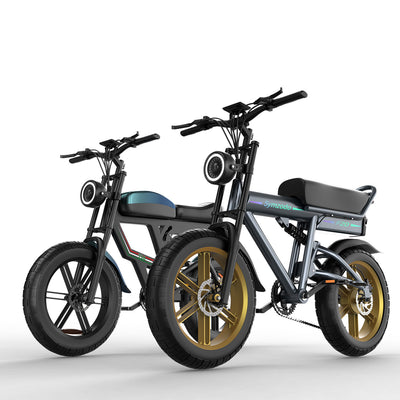There’s a lot of buzz about electric bikes lately. They’re fast, fun, and easy to use—but when we talk about going green, it’s worth taking a closer look. What’s the real electric bike environmental impact? Sure, they don’t run on gas, but what about the way they’re built, the energy they use, or their batteries?
If you’ve ever asked yourself, “Are e-bikes eco-friendly or just a trend?”—you’re not alone. Let’s break it down and see what riding one actually means for the planet.
What Makes an E‑Bike "Green"?
To figure out the electric bike environmental impact, you’ve got to start with what goes into making one. Unlike traditional bikes, electric ones have motors and batteries. That adds some carbon cost upfront, but it’s still far better than building a car.
Making one e-bike typically emits around 134 kg of CO₂. Compare that to over 5,000 kg of CO₂ to build a standard car, and the difference is huge. The big question—are e-bikes eco-friendly?—starts with the answer: they can be, if you factor in the entire lifecycle.
Once they hit the road, e-bikes don’t give off emissions. That makes the carbon footprint of electric bikes super low during daily use. But it’s not just about riding—it’s about how the bike was made, how long it lasts, and what happens to its parts after.
Comparing E‑Bikes to Cars and Public Transit
Let’s put some numbers to it. When it comes to the electric bike environmental impact versus other types of transportation, e-bikes win by a landslide for short-distance travel.
Here’s a quick breakdown of emissions per kilometer:
-
Car: 271g CO₂
-
Bus: 101g CO₂
-
Train: 41g CO₂
-
Electric Bike: Just 2–5g CO₂
That’s why people keep asking, Are e-bikes eco-friendly? Because they really are, especially when you use them in place of a car or a daily commute on diesel buses. The carbon footprint of electric bikes is tiny when you look at real-world travel.
Even charging the battery doesn’t add much—unless you’re using dirty power sources. With renewable energy, the numbers drop even further, making the electric bike environmental impact almost negligible.
The Environmental Cost of E‑Bike Batteries
This is the one part of the e-bike equation that deserves extra attention. The battery. It’s the heaviest piece—literally and environmentally. Lithium-ion batteries require materials like lithium, cobalt, and nickel, which need to be mined. Mining has environmental consequences, and that factors into the carbon footprint of electric bikes.
Battery production can make up 30–40% of the total electric bike environmental impact. So, while they don’t pollute during the ride, the materials inside them still leave a footprint.
That said, battery longevity and recycling make a big difference. The longer you use it and the better you dispose of it, the more truly eco-friendly your e-bike becomes. So when someone asks, Are e-bikes eco-friendly, the full answer includes what happens when the battery reaches the end of its life.
How to Maximize Your E‑Bike’s Sustainability
You’ve got your e-bike. Now, how do you ride greener? Small habits can keep the electric bike environmental impact as low as possible.
Charging Tips
-
Plug into solar or green energy when you can
-
Don’t drain the battery to zero every time
-
Unplug once it's fully charged
These small adjustments go a long way in shrinking the carbon footprint of electric bikes.
Battery Recycling Options
-
Never toss a battery in the trash
-
Find local e-waste recycling centers
-
Ask your bike shop about take-back programs
Recycling isn’t optional—it’s part of making sure the electric bike environmental impact stays minimal from start to finish. It also answers the question Are e-bikes eco-friendly in the right way: only if we handle their batteries responsibly.
Why This Shift Toward E-Bikes Matters
A lot of people are switching to e-bikes not just for convenience but because they care about the planet. The carbon footprint of electric bikes is significantly lower than that of most other transportation options. They use fewer resources, cut emissions in traffic-heavy cities, and help reduce overall dependence on fossil fuels.
As more cities push for cleaner air and fewer cars, e-bikes are becoming a major part of that shift. Their low electric bike environmental impact makes them a smarter, greener way to get around, especially when people use them for short daily errands or commutes.
So, are e-bikes eco-friendly? They are, especially when used thoughtfully and maintained properly.
So, Are E‑Bikes Really Worth It?
To wrap it up, the electric bike environmental impact is impressively low, especially compared to cars and public transport. The carbon footprint of electric bikes mainly comes from their batteries, but that can be managed with good charging habits and recycling. Overall, yes—are e-bikes eco-friendly? Absolutely, when used right.
If you want to explore more about sustainable commuting or how electric bikes fit into a cleaner future, take a look at how Ameritano is working toward that goal. Or just contact us if you’ve got questions—we’d love to chat.


